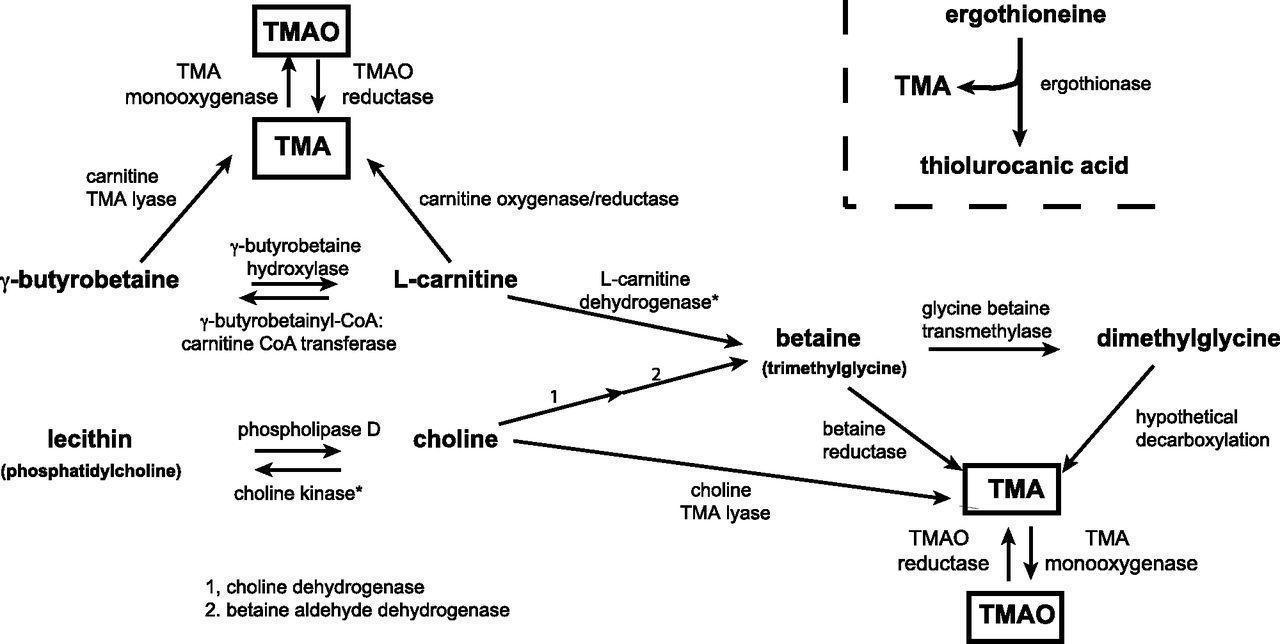Amazoniac
Member
Many people don't consume dairy and eggs (which are great sources of choline) due to intolerance/allergy, for not being able to find reliables ones, and/or for not finding them appealing. Some meats provide a considerable amount, but they're not eaten in sufficient quantities. Organ meats can be good sources but aren't consumed frequently enough, so we can disconsider them.
So a low choline intake isn't unlikely. To add to the problem:
And then you'll find subset of people avoiding even leafy greens due to the poison/"vitamin" A issue, so sources become scarce.
- Incomprehensive/ble Notes On Choline
- Meeting the Choline Requirement — Eggs, Organs, and the Wheat Paradox | Mito
- Consuming Creatine in Foods and Supplements | Mito
Therefore I suspect that having a decent choline supplement available for the community is something reasonable.
As far as I know, phosphatidylcholine is the least problematic form, but the choline supplements available are sourced from seeds and are often of poor quality.
The fatty acids attached to phosphatidylcholine are changed when metabolized, so it's possible for the fatty acid profile of a meal to be reflected in the phosphatidylcholine molecule to some extent when incorporated. This is an argument in favor of using any phosphatidylcholine ester, but if it's polyunsaturated, there would be an unecessary exposure to these fats in a weight ratio of about 1:8. As an example, for every 0.2 g of choline, it's an obtention of 1.6 g of PUFAs with the risk of these being incorporated where they shouldn't (hence Zeus using phosphatidylcholine as a carrier for fatty acids) and also adding up over time.
Zeus' Mitolipin would be ideal if it wasn't for the price and volume: it's clearly not intended to be a choline supplement.
200 mg/serving lasting 2 months or so is what I had in mind; it's a moderate dose that was found to be the average missing from people's diet. This is physically possible since the serving of lecithin products is 2.5 g, whereas such product would be less than 2 g.
Mitolipin provides less than 30 mg/serving, a bottle would last 5 days to supply that amount.
- Storage & Handling of Lipids | Avanti Lipids
How could conservative doses of it used as part of a complex be more problematic than a prolonged insufficiency? We can't ignore that its lack isn't something rare in this community.
If you have an object, please post.
By the way, I don't know why a 'No' alternative was included since it's about having enough people interested, and too many 'nitric oxide synthases' give an impression that it's not worth it.
--
@haidut @healthnatura @LifeGivingStore @Terma
So a low choline intake isn't unlikely. To add to the problem:
- Plenty of fructose
- Saturated fat in generous amounts
- Methionine restriction
- Low creatine (muscle meats)
- Not enough vegetables
- High-dose B-vitamins supplementation
- Impair'd liver and metabolism in general
- Estrogen artificially lowered
- Extraordinary needs
And then you'll find subset of people avoiding even leafy greens due to the poison/"vitamin" A issue, so sources become scarce.
- Incomprehensive/ble Notes On Choline
- Meeting the Choline Requirement — Eggs, Organs, and the Wheat Paradox | Mito
- Consuming Creatine in Foods and Supplements | Mito
Therefore I suspect that having a decent choline supplement available for the community is something reasonable.
As far as I know, phosphatidylcholine is the least problematic form, but the choline supplements available are sourced from seeds and are often of poor quality.
The fatty acids attached to phosphatidylcholine are changed when metabolized, so it's possible for the fatty acid profile of a meal to be reflected in the phosphatidylcholine molecule to some extent when incorporated. This is an argument in favor of using any phosphatidylcholine ester, but if it's polyunsaturated, there would be an unecessary exposure to these fats in a weight ratio of about 1:8. As an example, for every 0.2 g of choline, it's an obtention of 1.6 g of PUFAs with the risk of these being incorporated where they shouldn't (hence Zeus using phosphatidylcholine as a carrier for fatty acids) and also adding up over time.
Zeus' Mitolipin would be ideal if it wasn't for the price and volume: it's clearly not intended to be a choline supplement.
200 mg/serving lasting 2 months or so is what I had in mind; it's a moderate dose that was found to be the average missing from people's diet. This is physically possible since the serving of lecithin products is 2.5 g, whereas such product would be less than 2 g.
Mitolipin provides less than 30 mg/serving, a bottle would last 5 days to supply that amount.
- Storage & Handling of Lipids | Avanti Lipids
"Lipids composed of fatty acids that are completely saturated (e.g., dimyristoyl or dipalmitoyl phosphatidylcholine) are stable as powders."
"Lipids composed of fatty acids containing one or more double bonds (e.g., dioleoyl phosphatidylcholine or egg phosphatidylcholine) are not stable as powders. These lipids are extremely hygroscopic as powders and will quickly absorb moisture and become gummy upon opening the container. This could result in hydrolysis or oxidation of the material."
"Lipids composed of fatty acids containing one or more double bonds (e.g., dioleoyl phosphatidylcholine or egg phosphatidylcholine) are not stable as powders. These lipids are extremely hygroscopic as powders and will quickly absorb moisture and become gummy upon opening the container. This could result in hydrolysis or oxidation of the material."
How could conservative doses of it used as part of a complex be more problematic than a prolonged insufficiency? We can't ignore that its lack isn't something rare in this community.
If you have an object, please post.
By the way, I don't know why a 'No' alternative was included since it's about having enough people interested, and too many 'nitric oxide synthases' give an impression that it's not worth it.
--
@haidut @healthnatura @LifeGivingStore @Terma
Last edited:

